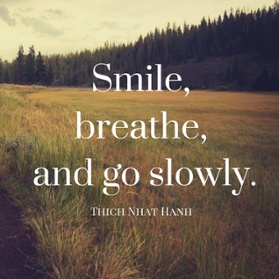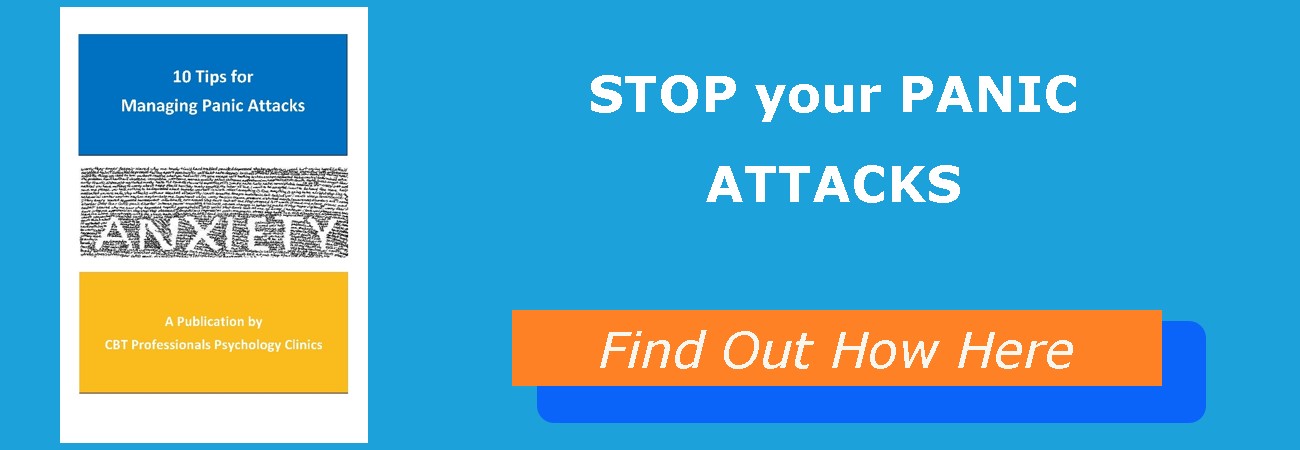- Gold Coast Psychologists & Online Psychologists
- Coomera (07) 5551 0251
- Nerang (07) 5668 3490
- admin@cbtprofessionals.com.au
15 Strategies on How to Stop a Panic Attack
Panic Attacks
If you are suffering panic attacks, you are not alone! At least 5% of the population have experienced panic attacks. There may be many more people who never tell anyone about their attacks. This blog is sharing some good news! You can learn what to do during a panic attack and how to stop them. Psychologists know of lots of strategies you can use to help deal with panic attacks so that they don’t control you.
It is important to realise that anxiety is normal and helps prepare us for danger. In moderation, it even improves our efficiency in performing a skilled activity. Therefore, our goal is not to get rid of all anxiety. However, anxiety can be a problem in our lives when our brain and body tells us there is danger when there is no real threat. We can come to experience intense and frequent anxiety, fear anxiety symptoms and many situations and avoid doing important daily life activities e.g. going shopping, catching public transport, working etc.
What to do during a panic attack [and how to stop them
- Do not let your panic attacks control you.
- Stay where you are, don’t escape/run away from the situation. In confronting your fear you give yourself a chance to learn that there is no danger to you.
- If you are breathing too quickly this can make your symptoms worse. Try a slow-breathing exercise as soon as you can when you notice anxiety or panic (see explanation below).
- Remind yourself what is happening – ‘this is a panic attack’, ‘these are symptoms of anxiety’.
- Remind yourself about the facts ‘panic attacks are not harmful’, ‘this is a false alarm’.
- Ride out the attack, remind yourself ‘it won’t last long’.
- Try opening up to your feelings allowing them to be.
- Ground yourself in the moment. Notice what you can see and hear in the environment around you. Notice you can move your body at the same time that you have this anxiety.
- As soon as you can, get back to what you were doing and continue with your plan. It can be helpful to remind yourself what this activity contributes to your life or why it is important to help motivate you to keep going.
Breathing exercise for during a panic attack
If you are breathing too quickly you change the levels of gases in your bloodstream and your carbon dioxide levels drop too low setting off a chemical chain reaction. This changes the blood flow around your body and can make you feel dizzy, light-headed, nauseous, make your chest feel tight, sensations of pins and needles, or feeling like you can’t breathe.
- Support yourself by sitting down or leaning against something.
- Slowly and gently empty your lungs first before breathing in. Gently push out all the air.
- Pause for 1 or 2 seconds.
- Breathe gently and slowly in through your nose into your lower belly for about 4 seconds.
- Pause for about 1 or 2 seconds.
- Then breathe out through your mouth, slowly, gently for about 4 seconds.
- Pause again before taking another breath.
- Continue slow breathing while you deal with your anxiety.
Practice slow breathing often, including practicing when you are relaxed so that you are more likely to be able to use it when your anxiety is intense.

10. Coping Cards
Until you get use to riding out your panic attacks you may find it helpful to write on a small card, that you can keep handy in your wallet to use at any time, some helpful thoughts and facts about panic attacks such as:
“It will pass quickly”
“It isn’t dangerous”
“This is a panic attack”
“This is my body’s fight or flight response but it is a false alarm”
“There is no physical danger, I will be alright”
Further Helpers in Dealing with Panic Attacks
11. Make relaxation a part of your daily life with strategies such as: progressive muscle relaxation techniques where you contract and release each muscle group moving from head to toe, yoga, doing the things you enjoy, having a warm bath, listening to music, etc. Create your own menu of relaxation strategies.
12.Regularly practice your breathing exercises, helpful self-talk, grounding and relaxation strategies so that you are more likely to use these helpers when trying out what to do during a panic attack.
13. Have healthy lifestyle habits:
- regular exercise such as a brisk walk can help release tension
- nurture your body with regular healthy meals
- reduce/avoid alcohol, caffeine, smoking
14. Problem solving: Consider whether you can make changes for any of the stressors in your daily life such as at work or in your relationships. Are there any life problems you need to deal with?
15. Learning mindfulness skills can help you to separate from your thoughts, open up to your feelings and make values guided choices in your daily life.
Do I have a psychological disorder?
This blog offers some tips about what to do during a panic attack. If you are suffering panic attacks this does not mean that you have a psychological disorder. These tips may be enough for you to cope with your panic attacks. However, panic attacks can occur in the context of psychological disorders such as anxiety disorders (e.g. Panic Disorder and Agoraphobia), depressive disorders, posttraumatic stress disorder, substance use disorders and also in some medical conditions. It can be helpful to discuss your panic attacks with your Doctor who can complete relevant medical and psychological assessments and refer you for psychological therapy if required.
Overall, remember to reward and encourage yourself for your effort in dealing with your panic. It can be very challenging and being kind and compassionate toward yourself can really help.
For even more tips on how to manage panic attacks, we have prepared a free guide 10 Tips for Managing Panic Attacks that you can download and keep.


